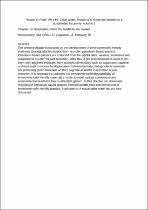JavaScript is disabled for your browser. Some features of this site may not work without it.
- ResearchSpace
- →
- Research Publications/Outputs
- →
- Book Chapters
- →
- View Item
| dc.contributor.author |
Muniyasamy, Sudhakar

|
|
| dc.contributor.author |
Ofosu, Osei

|
|
| dc.contributor.author |
Linganiso, LZ

|
|
| dc.contributor.author |
Motaung, TE

|
|
| dc.date.accessioned | 2019-03-11T06:39:59Z | |
| dc.date.available | 2019-03-11T06:39:59Z | |
| dc.date.issued | 2018-03 | |
| dc.identifier.citation | Muniyasamy, S., Ofosu, O., Linganiso, LZ and Motaung, TE. 2018. Bioplastics: From the landfill to the market. "Waste-to-Profit" (W-t-P): Value added Products to Generate Wealth for a Sustainable Economy, volume 1, pp 203-226. | en_US |
| dc.identifier.isbn | 978-1-53613-236-6 | |
| dc.identifier.uri | https://novapublishers.com/shop/waste-to-profit-w-t-p-value-added-products-to-generate-wealth-for-a-sustainable-economy-volume-1/ | |
| dc.identifier.uri | http://hdl.handle.net/10204/10776 | |
| dc.description | Copyright: 2018 Nova Publishers. Due to copyright restrictions, the attached PDF file only contains the abstract of the full text item. For access to the full text item, kindly consult the publisher's website. | en_US |
| dc.description.abstract | The present chapter is focused on the development of environmentally friendly materials (biodegradable plastics) from recycled petroleum based plastics. Petroleum based plastics are collected from the landfill sites, washes, separated and subjected to a cutter for size reduction. After this, a hot melt extrusion is used to mix them with additives extracted from agricultural residues such as sugarcane bagasse or maize stalk to induce biodegradation. Environmentally biodegradable materials are promising green materials as they degrade at landfill in less than a year. However, it is necessary to address the enviornmental biodegradability of environmentally friendly materials in order to meet various commercial and environmental needs for their sustainable growth. In this chapter, we discussed recycling of petroleum based plastics from the landfill sites and conversion to environmentally friendly plastics. Applications of sustainable materials are also discussed. | en_US |
| dc.language.iso | en | en_US |
| dc.publisher | Nova Publishers | en_US |
| dc.relation.ispartofseries | Worklist;"Waste-to-Profit" (W-t-P): Value added Products to Generate Wealth for a Sustainable Economy, volume 1 | |
| dc.relation.ispartofseries | Worklist;20589 | |
| dc.subject | Petroleum based plastics | en_US |
| dc.subject | Additives | en_US |
| dc.subject | Induced biodegradation | en_US |
| dc.subject | Environmentally biodegradable plastics | en_US |
| dc.title | Bioplastics: From the landfill to the market | en_US |
| dc.type | Book Chapter | en_US |
| dc.identifier.apacitation | Muniyasamy, S., Ofosu, O., Linganiso, L., & Motaung, T. (2018). Bioplastics: From the landfill to the market., <i>Worklist;"Waste-To-Profit" (W-T-P): Value added Products to Generate Wealth for a Sustainable Economy, volume 1</i> Nova Publishers. http://hdl.handle.net/10204/10776 | en_ZA |
| dc.identifier.chicagocitation | Muniyasamy, Sudhakar, Osei Ofosu, LZ Linganiso, and TE Motaung. "Bioplastics: From the landfill to the market" In <i>WORKLIST;"WASTE-TO-PROFIT" (W-T-P): VALUE ADDED PRODUCTS TO GENERATE WEALTH FOR A SUSTAINABLE ECONOMY, VOLUME 1</i>, n.p.: Nova Publishers. 2018. http://hdl.handle.net/10204/10776. | en_ZA |
| dc.identifier.vancouvercitation | Muniyasamy S, Ofosu O, Linganiso L, Motaung T. Bioplastics: From the landfill to the market.. Worklist;"Waste-to-Profit" (W-t-P): Value added Products to Generate Wealth for a Sustainable Economy, volume 1. [place unknown]: Nova Publishers; 2018. [cited yyyy month dd]. http://hdl.handle.net/10204/10776. | en_ZA |
| dc.identifier.ris | TY - Book Chapter AU - Muniyasamy, Sudhakar AU - Ofosu, Osei AU - Linganiso, LZ AU - Motaung, TE AB - The present chapter is focused on the development of environmentally friendly materials (biodegradable plastics) from recycled petroleum based plastics. Petroleum based plastics are collected from the landfill sites, washes, separated and subjected to a cutter for size reduction. After this, a hot melt extrusion is used to mix them with additives extracted from agricultural residues such as sugarcane bagasse or maize stalk to induce biodegradation. Environmentally biodegradable materials are promising green materials as they degrade at landfill in less than a year. However, it is necessary to address the enviornmental biodegradability of environmentally friendly materials in order to meet various commercial and environmental needs for their sustainable growth. In this chapter, we discussed recycling of petroleum based plastics from the landfill sites and conversion to environmentally friendly plastics. Applications of sustainable materials are also discussed. DA - 2018-03 DB - ResearchSpace DP - CSIR KW - Petroleum based plastics KW - Additives KW - Induced biodegradation KW - Environmentally biodegradable plastics LK - https://researchspace.csir.co.za PY - 2018 SM - 978-1-53613-236-6 T1 - Bioplastics: From the landfill to the market TI - Bioplastics: From the landfill to the market UR - http://hdl.handle.net/10204/10776 ER - | en_ZA |






